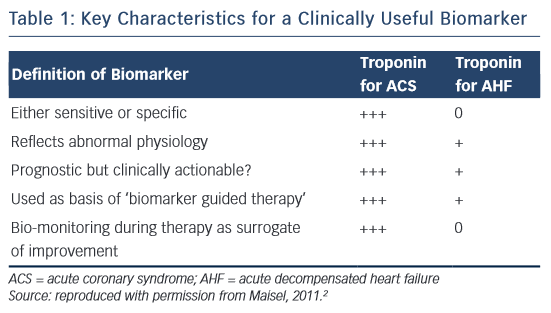 Cardiac troponin (cTn) is the core biomarker for the diagnosis of a myocardial infarct (MI).1 Indeed, as stated in Table 1, it meets all the definitions of a biomarker for acute coronary syndrome (ACS), as suggested by Maisel.2 In the setting of ACS, in addition to its diagnostic use, it is prognostic, clinically actionable and can be monitored during therapy as a surrogate of improvement. In acute decompensated heart failure (AHF), cTn is a valuable biomarker for prognosis; however, it does not aid in the diagnosis of AHF and its role as an actionable biomarker is unclear. Guidelines recommend measuring cTn levels in patients presenting with AHF to evaluate for an ACS event as well as for assessment of prognosis and disease severity.3 There are many reasons that cTn levels can be elevated in heart failure, as well as other disease processes, other than acute ischaemia.1 The implications of troponin in heart failure has been reviewed previously.4,5 This review will focus on the literature on cTn elevation in patients presenting with AHF, with special attention to new high-sense troponin (hsTn) assays.
Cardiac troponin (cTn) is the core biomarker for the diagnosis of a myocardial infarct (MI).1 Indeed, as stated in Table 1, it meets all the definitions of a biomarker for acute coronary syndrome (ACS), as suggested by Maisel.2 In the setting of ACS, in addition to its diagnostic use, it is prognostic, clinically actionable and can be monitored during therapy as a surrogate of improvement. In acute decompensated heart failure (AHF), cTn is a valuable biomarker for prognosis; however, it does not aid in the diagnosis of AHF and its role as an actionable biomarker is unclear. Guidelines recommend measuring cTn levels in patients presenting with AHF to evaluate for an ACS event as well as for assessment of prognosis and disease severity.3 There are many reasons that cTn levels can be elevated in heart failure, as well as other disease processes, other than acute ischaemia.1 The implications of troponin in heart failure has been reviewed previously.4,5 This review will focus on the literature on cTn elevation in patients presenting with AHF, with special attention to new high-sense troponin (hsTn) assays.